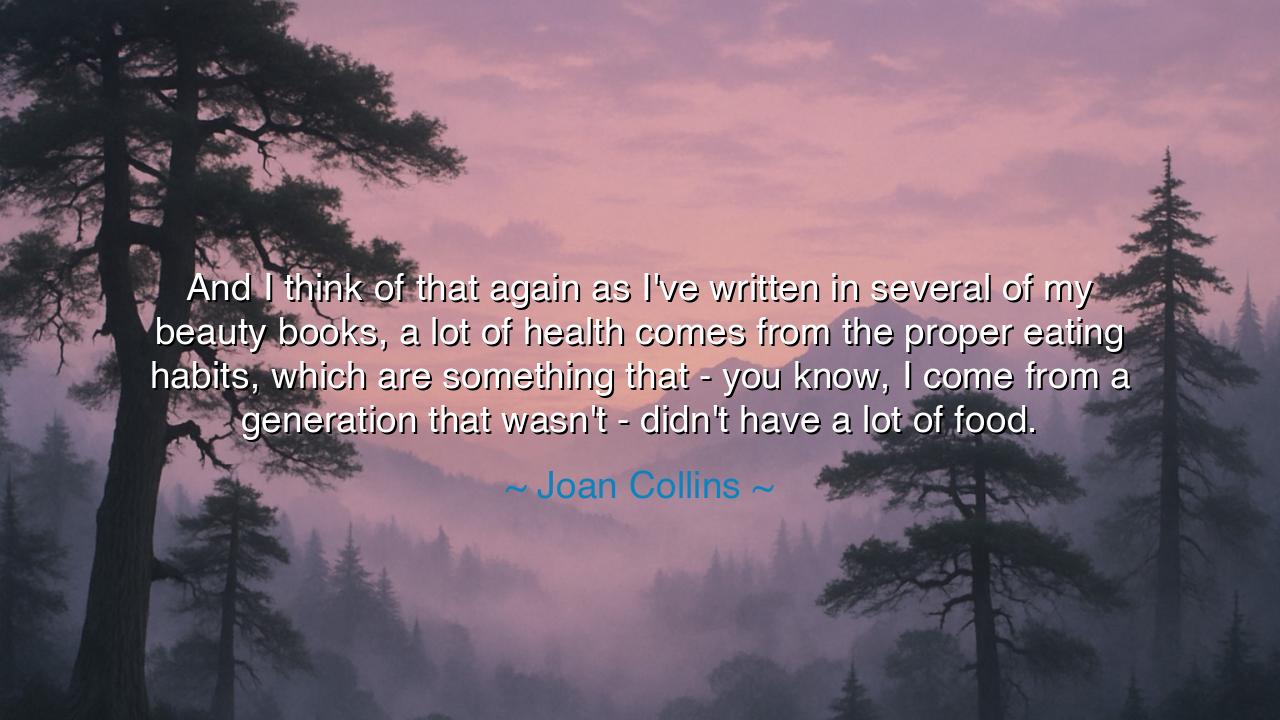
And I think of that again as I've written in several of my beauty
And I think of that again as I've written in several of my beauty books, a lot of health comes from the proper eating habits, which are something that - you know, I come from a generation that wasn't - didn't have a lot of food.






“And I think of that again as I’ve written in several of my beauty books, a lot of health comes from the proper eating habits, which are something that—you know, I come from a generation that wasn’t—didn’t have a lot of food.” – Joan Collins
In these reflective words, Joan Collins, the actress and icon of grace, speaks not merely of beauty or health, but of gratitude, discipline, and wisdom born of scarcity. Behind her refined tone lies the memory of an age marked by restraint, when food was not abundant and every meal was cherished. To her, health is not the product of luxury, but of awareness — the ability to understand what nourishes, to honor the body as the vessel of the spirit. Her words echo like those of an elder passing down the lessons of endurance: that the truest form of beauty begins not with adornment, but with the care of the self through balance and moderation.
She reminds us that she came from a generation that didn’t have much food, a generation that learned patience and discipline through necessity. In the aftermath of war and hardship, people ate not for pleasure, but for survival. They understood the preciousness of nourishment, the sacredness of a shared meal. It was an age when waste was shameful and simplicity was virtue. From that hardship, a deeper wisdom arose — that health and beauty are the children of temperance, not indulgence. Collins, shaped by that era, carries its torch into a world now blinded by excess, where plenty has often led to neglect of gratitude and respect for the body.
The ancients, too, spoke of this truth. The Greeks taught the virtue of sophrosyne — moderation, the harmony between desire and reason. The philosopher Hippocrates, father of medicine, declared that food should be one’s medicine, and that imbalance in diet was the root of disease. Joan Collins’s words echo these timeless principles: that proper eating habits are not a passing trend but a form of discipline that connects us to nature’s rhythm. To eat consciously is to live in balance, to honor both the hunger and the restraint that sustain life’s equilibrium.
Consider the story of Mahatma Gandhi, who also came from a time of scarcity. He taught that self-control in food leads to mastery of the spirit. Though surrounded by temptation in his later years, he chose simplicity — a handful of nuts, a little fruit, a bowl of rice. In denying excess, he found strength; in restraint, he found freedom. Like Joan Collins, he understood that when one learns to listen to the body rather than the craving, true health arises not from abundance, but from wisdom and awareness.
Collins’s reflection is also a gentle critique of the modern age — a time of plenty, yet plagued by illness and dissatisfaction. Where once hunger taught gratitude, abundance now tempts us to forget the sanctity of nourishment. We eat in haste, chasing pleasure rather than sustenance, and the result is not vitality but fatigue, not beauty but imbalance. Her words call us to return to mindfulness: to rediscover the sacred art of eating well, where each bite is taken with reverence for the body’s needs and for the earth’s gifts.
In her recognition that health comes from proper eating habits, Collins elevates food from mere consumption to an act of care. Just as one polishes a precious gem or tends a sacred flame, we must tend our bodies with respect and discernment. The act of eating becomes a ritual — not of indulgence, but of renewal. The ancients would say that to eat rightly is to align the self with the cosmos, to honor the divine rhythm that flows through seed, soil, and spirit alike.
Therefore, children of the modern world, take this wisdom to heart: gratitude and moderation are the twin pillars of lasting health. Let your food be chosen with thought, your portions guided by need, your table a place of thankfulness, not excess. Remember the lessons of those who lived with less — that true vitality springs from simplicity, and that a nourished soul shines brighter than a decorated body. As Collins teaches, beauty and health are not born in luxury, but in the quiet strength of self-awareness and the humble appreciation of every meal.
And so, let us return to what she reminds us of: that the art of living well begins with the art of eating wisely and gratefully. To nourish the body with care is to honor the life it holds. For in the end, abundance is not measured by how much we consume, but by how deeply we cherish what we have.






AAdministratorAdministrator
Welcome, honored guests. Please leave a comment, we will respond soon